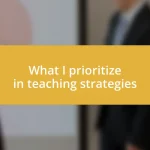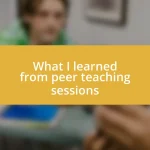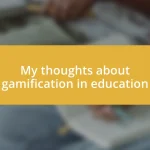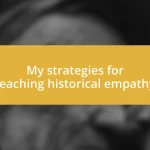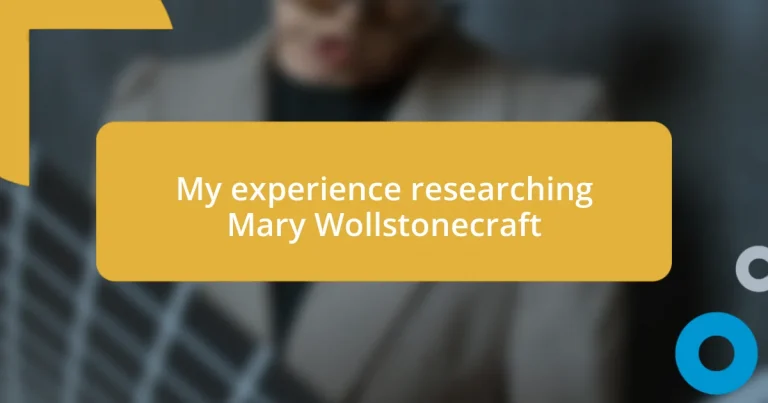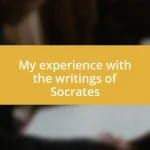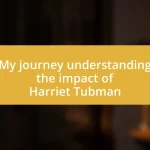Key takeaways:
- Mary Wollstonecraft’s groundbreaking work in feminism highlighted the necessity of education for women, asserting it as crucial for personal and societal progress.
- Her writings challenged societal norms and emphasized women’s rational agency, promoting a shift in perceptions about women’s roles beyond domestic confines.
- Wollstonecraft’s legacy inspires ongoing dialogues about gender equality, encouraging contemporary advocates to reflect on their roles in continuing her mission for empowerment and justice.
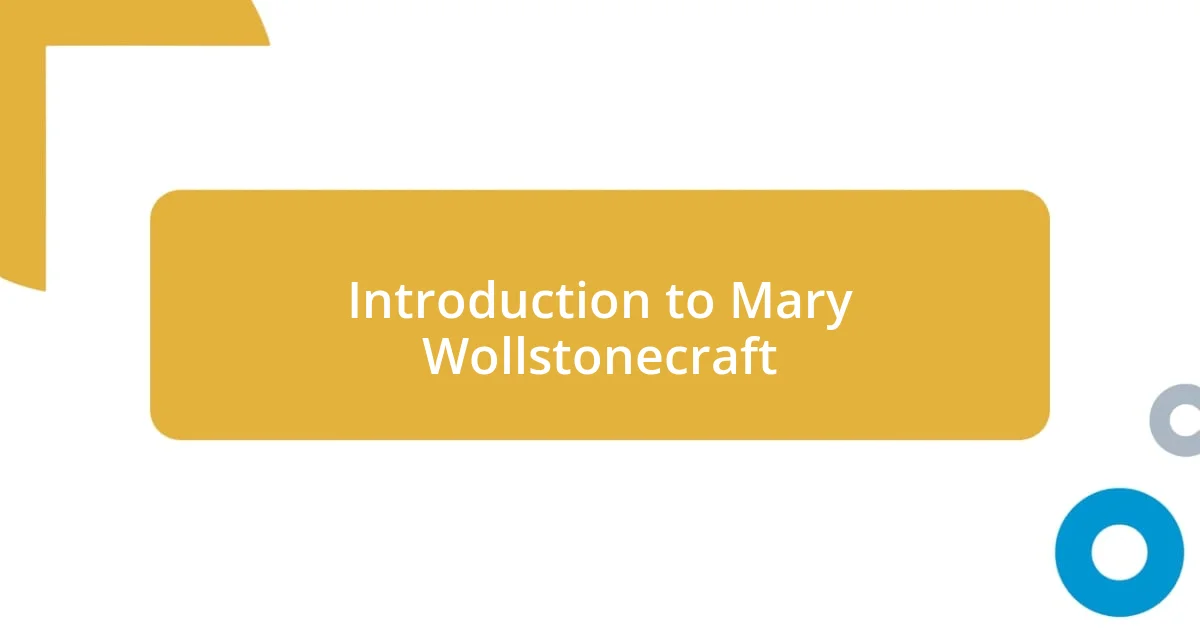
Introduction to Mary Wollstonecraft
Mary Wollstonecraft was a pioneering figure in the realm of feminist philosophy, whose ideas were revolutionary for her time. I remember the first moment I encountered her seminal work, “A Vindication of the Rights of Woman.” It struck me how deeply her arguments about education and equality resonated, prompting me to reflect on the very foundations of my own beliefs.
As I delved deeper into her life, I couldn’t help but feel a sense of admiration for her courage. Wollstonecraft challenged societal norms and fought for women’s rights during a period when such ideas were met with fierce opposition. Have you ever considered how many lives have been influenced by just one person’s conviction? It’s a humbling thought to realize that her advocacy laid groundwork that many still build upon today.
What really amazed me about Wollstonecraft was her ability to intertwine personal experience with political thought. She didn’t shy away from her struggles, and this vulnerability makes her work so relatable. Reflecting on her journey, I’ve often wondered how many people today have that same fire to speak out against injustice—how would the world shift if we all embraced our inner Wollstonecraft?

Importance of Wollstonecraft’s Work
Wollstonecraft’s work is vital because it laid the foundation for modern feminist thought, pushing the idea of equality beyond mere suffrage. I recall a lively discussion I had with friends about whether true equality could exist without equal access to education. Wollstonecraft argued passionately that education was crucial, and this struck a chord with me; it doesn’t just empower women but enriches society as a whole. How could we ever expect progress without informed voices?
It’s impressive how her writings transcend time, continuing to spark debates today. I often find myself returning to her passages when grappling with contemporary issues surrounding gender and empowerment. Each encounter feels like I’m not just reading history but engaging in a dialogue with my past self—reminding me of the significance of championing women’s rights and embracing diverse perspectives. Have you ever felt inspired by the wisdom of those who came before you?
Lastly, Wollstonecraft’s advocacy for rational thought in women’s education challenged the notion that emotions alone should guide women’s lives. I believe her insistence on reason was groundbreaking, allowing future generations to rethink their roles. Reflecting on this, I remember a moment in a classroom where we debated the balance between emotion and logic; it was transformative to see my peers connect with Wollstonecraft’s legacy in real-time.
| Key Aspect | Wollstonecraft’s Influence |
|---|---|
| Education | Advocated for equal access, emphasizing its importance for societal progress. |
| Timelessness | Continues to inspire discussions on gender equality and women’s empowerment. |
| Rational Thought | Promoted the use of reason over emotion, shaping views on women’s roles in society. |

Key Themes in Wollstonecraft’s Writings
Wollstonecraft’s writings are rich with themes that resonate deeply with anyone reflecting on gender equality and the pursuit of justice. I often think back to the moment I first grasped her advocacy for reasoned education—not just as a tool for women but as a means to elevate society as a whole. Her insistence that women should not be confined to the domestic sphere opened my eyes to a broader understanding of potential, illuminating how much we underestimate ourselves when we accept societal limits.
Here are some key themes that I found particularly striking in Wollstonecraft’s work:
-
Empowerment through Education: She believed that education was a fundamental right for women, serving as a pathway to autonomy and personal growth.
-
Critique of Social Norms: Wollstonecraft boldly challenged the traditional roles assigned to women, arguing for their full participation in all aspects of life.
-
Moral and Rational Agency: Her writings emphasized the importance of women as rational beings capable of making moral choices, thereby dismantling stereotypes of emotional weakness.
Reflecting on these themes makes me realize how they still resonate today. In my discussions with friends, I’ve seen light bulbs go off as they connect the dots between Wollstonecraft’s ideas and their own struggles for equality. It reinforces my belief that her work is not merely historical but an active part of the ongoing dialogue about women’s rights.
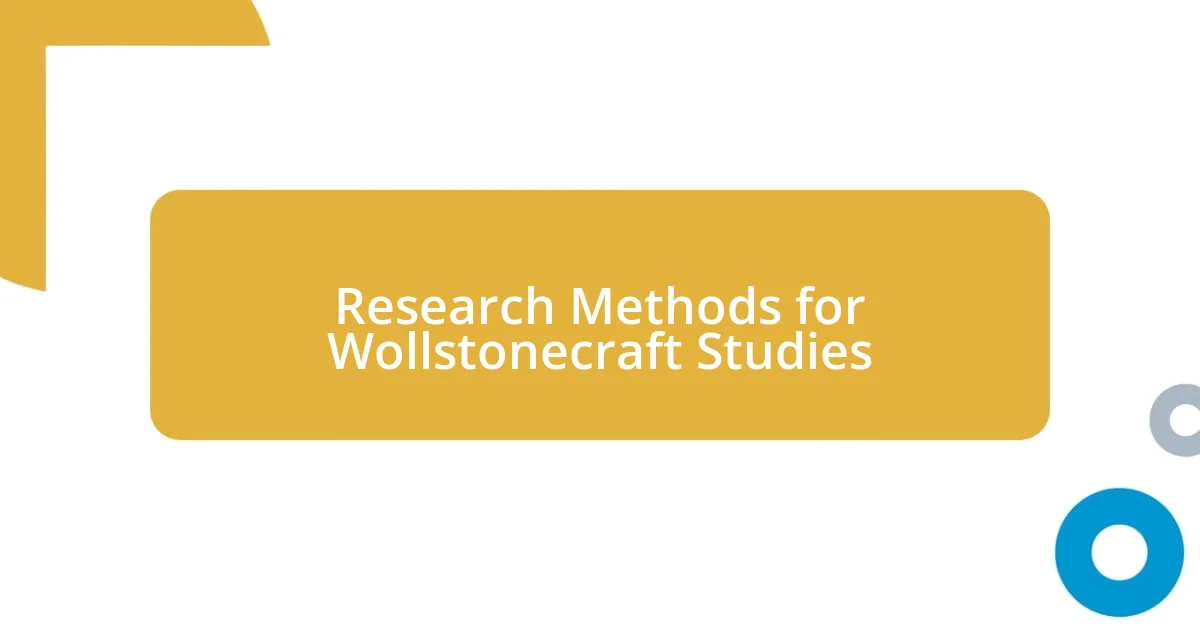
Research Methods for Wollstonecraft Studies
When delving into Mary Wollstonecraft’s work, I found that diverse research methods really enhanced my understanding. Combining primary sources with secondary analyses gave me a well-rounded perspective. It’s one thing to read Wollstonecraft’s texts directly, but pairing her writings with scholarly critiques opened up conversations that I hadn’t anticipated. Have you ever unearthed a gem of insight that transformed how you view a topic?
I discovered that engaging with different interpretations of her work was key. For instance, attending seminars where scholars debated her impact on feminist thought helped me see the nuances of her arguments. When I shared my reflections from those discussions with classmates, I felt a genuine sense of camaraderie as we unpicked the layers of her philosophies together. It was like sharing the same book while sitting in different chapters, each perspective illuminating another part of the narrative.
While digital archives have streamlined access to Wollstonecraft’s writings, I personally preferred navigating through physical texts. There’s something palpable about flipping through pages, jotting down notes in the margins, and feeling connected to the historical context that surrounds them. I often wonder, how much can we lose in a purely digital experience? For me, being able to interact with the physical texts fostered a deeper emotional connection that made her struggles and triumphs feel even more vivid.
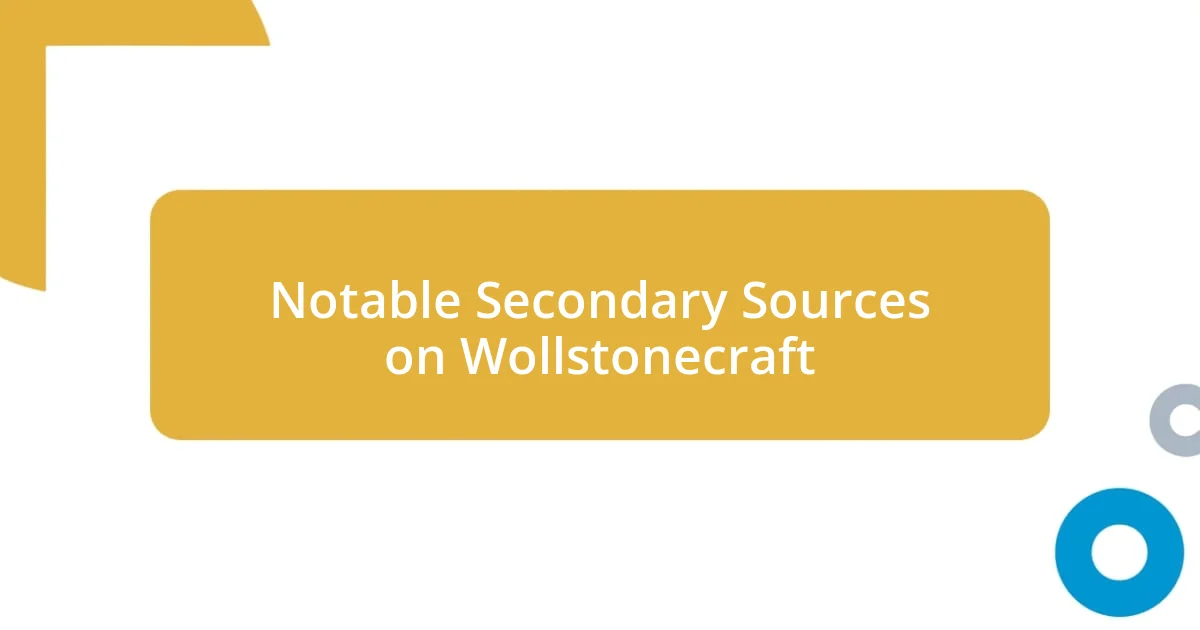
Notable Secondary Sources on Wollstonecraft
When researching Mary Wollstonecraft, I stumbled upon several secondary sources that really enriched my understanding of her work. One notable book was “Mary Wollstonecraft: A Literary Life” by Janet Todd. It provided a comprehensive view of Wollstonecraft’s writings and personal life, making her struggles and achievements come alive in a way that felt incredibly relatable. I recall how reading about her challenges sparked a personal reflection on my own battles with societal expectations.
Another excellent source is “The Philosopher’s Daughter” by Amanda Foreman, which interweaves Wollstonecraft’s ideas with her historical context. This approach opened my eyes to how deeply her life experiences influenced her advocacy for women’s rights. It was as if I could hear Wollstonecraft’s voice urging me to question the norms I encounter daily. Have you ever come across a text that felt like it was speaking directly to your own experiences? That’s precisely how I felt with Foreman’s narrative — it was both enlightening and empowering.
Finally, I found the collection “The Cambridge Companion to Mary Wollstonecraft” quite insightful. Each essay presents different critical perspectives, and I could see how my own interpretations of Wollstonecraft’s work were shaped through those lenses. I remember discussing these perspectives with a group of friends, and we often found ourselves debating which themes resonated most with us. This interaction not only enhanced my appreciation for Wollstonecraft but also underscored her relevance in our modern discussions about equality and empowerment. Isn’t it fascinating how a historical figure can transcend time, continually inspiring new generations?
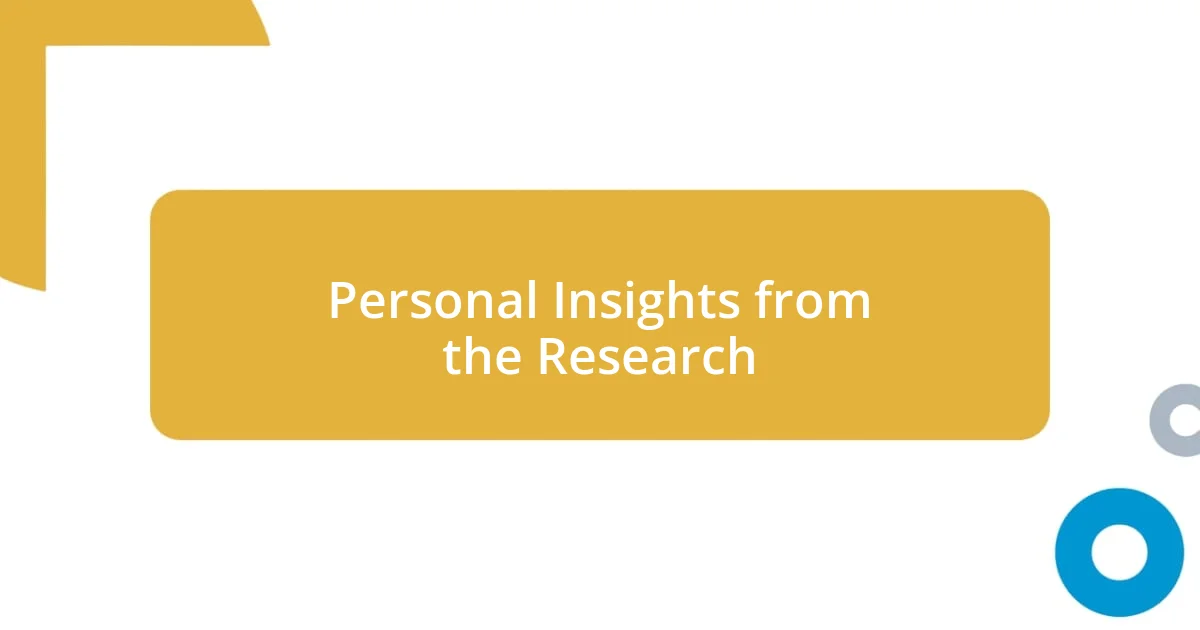
Personal Insights from the Research
As I immersed myself in Wollstonecraft’s writings, I couldn’t help but feel a sense of admiration mixed with frustration. While her eloquence spoke directly to the yearnings for liberation, I often found myself pondering the barriers she faced. Did you ever feel an overwhelming connection to someone from the past, as if their struggles were echoing your own? For me, this was particularly palpable when reflecting on her bold declarations about women’s education; it resonated with my own experiences grappling with societal expectations in my educational journey.
I vividly recall one instance when I read “A Vindication of the Rights of Woman” late into the night. My surroundings faded away as I became enveloped in her passionate prose. I felt a surge of inspiration, yet it was tinged with sadness for how her advocacy went unrecognized during her lifetime. Have you experienced moments where literature sparks a fire in you while also making you lament the struggles of those who came before? That night resonated with me deeply; it prompted me to question my role in today’s ongoing fight for equality.
What surprised me most was how personal her life’s challenges mirrored my own. Discovering her failures and resilience allowed me to reflect on my own setbacks. I often ask myself, how can I turn my failures into stepping stones? Wollstonecraft’s tenacity became a guiding light for me, reminding me that even in moments of doubt, determination can lead to profound change. Reflecting on her journey has paved the way for me to view my own challenges with renewed perspective and strength.

Conclusion on Wollstonecraft’s Legacy
Wollstonecraft’s legacy is a tapestry woven from her tireless championing of women’s rights and education, which continues to influence us today. Reflecting on her work, I can’t help but think about how her thought processes resonate with the feminist dialogues happening now. Have you ever felt that a historical figure’s struggles feel strangely relevant in modern times? For me, this connection is what makes Wollstonecraft’s writings not just historical artifacts, but living documents that challenge us to persist in our quest for equality.
During my research, I was particularly struck by her insistence on the necessity of education for women. It reminds me of my own journey in higher education, where I observed the power dynamics at play in the classroom. Have you experienced the thrill of realizing that your voice matters? Wollstonecraft’s assertion that women should be educated to take part in society reflects my personal belief that true empowerment stems from knowledge. Each time I engage in a discussion about equity, I feel her spirit urging me to advocate strongly for those whose voices remain unheard.
Ultimately, I believe Wollstonecraft’s legacy serves as both an inspiration and a challenge. It inspires us to reflect on our roles in continuing her mission while urging us to confront societal norms that persistently need dismantling. Have you considered how your own actions can contribute to her vision? As I ponder this, I recognize that our collective efforts are central to making lasting changes, and I find comfort in knowing that Wollstonecraft laid a foundation that we are still building upon today.


